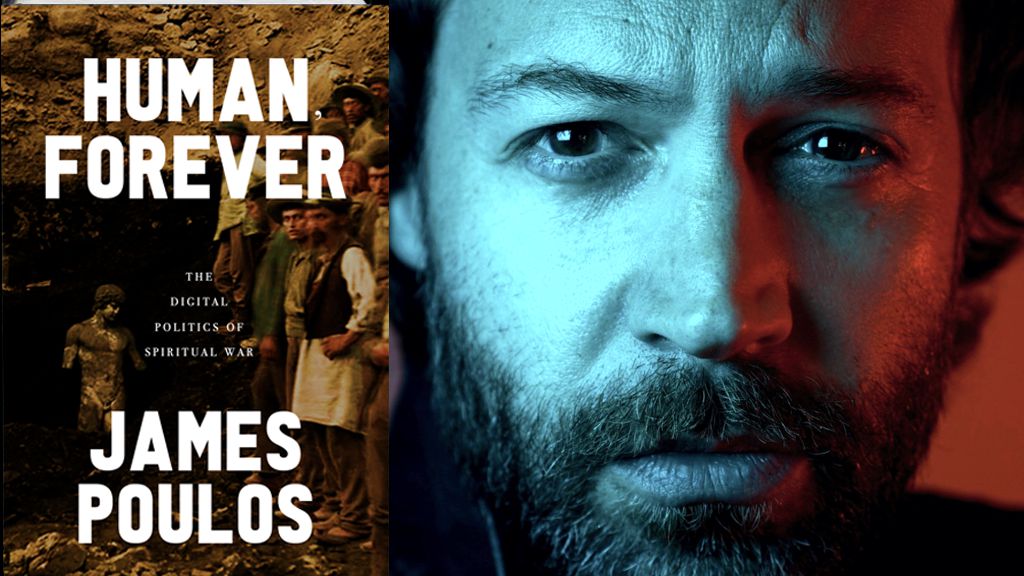The editor of The American Mind has declared war. If his new book doesn’t shake you awake, you were meant to be a machine.
The world has already ended. The “cyborg age” arrived so quietly, few people noticed. Each person now carries a permanent digital device in his palm. In the blink of an eye, all of us—from the developed world to the farthest backwaters—were turned into cyborgs.
The year 2021 will be remembered as Year Zero. The children born into this “digital catastrophe” will be known as the First Generation. Our only recourse is to teach them how to survive or help them discover means of survival under the “digital swarm” unleashed upon us.
This is the argument laid out in Human Forever: The Digital Politics of Spiritual War, the latest book by James Poulos. If the premise sounds like science fiction, you haven’t been paying attention. As the powerful struggle for dominance, and the rest power through their lives, technology has seduced all our souls with little need of direct force.
Human Forever is a work of profound scholarship, conveyed with Straussian subtlety. Poulos’s narrative weaves together the finest minds to wrestle with technology’s impact: Marshall McLuhan, Norbert Wiener, Lewis Mumford, and David Deutsch, among others—including a superb confrontation with the posthuman mutant Benjamin Bratton.
In an effort to recover from the digital catastrophe, Poulos steadies himself on the Western tradition—Greek, Christian, and American—as a spiritual bulwark against electronic oblivion. “Until further notice, we must live—recognizably as we were created,” he writes. “Our task is not to ascend infinitely toward heaven or bring it ever closer down to earth, not to escape into the Creator or into creation, but to remain ourselves indefinitely.”
As executive editor of The American Mind and a fellow at The Center for the Study of Digital Life, Poulos had enormous momentum behind his manifesto, written in a single season. He skillfully channels the wisdom of the intellectual Right, while grasping the technical details of our greatest threat: digital dissolution.
How do we preserve humanity in the face of this rapid transformation? Poulos urges guarded “inwardness” in the maelstrom. Looking ahead, he emphasizes the rites of passage that turn young boys into men, elevating them to become “guardians of civilization.” Facing an uncertain future, they must be prepared to forge new paths we could never predict. They must be ready for spiritual war.
After the Digital Catastrophe
Human Forever delivers an alarming report from the enemy lines. One has only to observe children, or any person, stare blankly into their screens to predict the dead zone ahead. “The most arresting vision of the digital swarm acquiring a life of its own, a life over us, is the one aroused by the harsh comparison to human beings that, unlike us, the digital swarm does not need to be alive.” At once obvious and invisible, these lifeless automata wield unprecedented power over our minds and behavior.
Poulos describes this process as mental terraforming. Our social landscape is reconfigured according to the influence of digital devices and those who control them. By extracting our data and mining our private moments for profit and power, Silicon Valley titans, shadowy third-parties, and intelligence agencies are creating detailed models of our personalities—one by one—manipulating us to conform to their ideal simulation. In the aggregate, this process is creating a new type of human being: experimental subjects in a “cyborg vivarium.”
The electric phantasms that enshroud our minds, Poulos argues, stoke the imagination while eroding our memory. This lost memory is not limited to mere recall, which has certainly been outsourced to our devices. Rather, the delusional state sustained by digital culture has separated us from our own biographies and deep cultural lineage. This digital culture, dead and soulless, freezes our development in a perpetual present, with vapid fantasies of the future flickering on the edge of our screens.
“The master key to the transformational project of the transmaterial self is the work of queering,” Poulos says of the virtual realm (and the current regime). “Queered to the point of posthumanity, our consciousness has no need for human memory of who any of us were born as, or what any of our meat bodies, as they say, once looked like. … Memory can be relegated to the machines.” To the extent our natural heritage is preserved in this sadistic process, it’s warped and turned against us.
On a more mundane level, as artificial intelligence is increasingly employed to direct our attention or determine public policy, AI ethics provides justification to control of these silicon slave-drivers. In America, the left has paid far more attention to this shift toward digital power structures than the right:
It is this faction that has tried to impose itself atop the stack of ethereal ethicists and establish itself as the imaginative will in charge of digitalization, automation, face recognition, and artificial intelligence. … [T]heir desired catechesis is a totalistic universal incompatible with the foundational folkways of American civilization and unable to encompass and infuse it under the pluralizing pressure of the digital age.
Poulos correctly identifies their endgame, whether by design or default, as a social credit system that confers privilege or ostracism in accord with those commanding the digital swarm. He takes a complex view of this chaotic development, though. People on the left are still as vulnerable to the psychic erosion of rampant digitalization as those on the right, if not more so. Conservatives may have become complacent, but as Poulos dryly notes, liberals have devolved into repellent variations of the O-mouthed Soyface.
Even though digitalization has devastated American culture and Christian tradition, Poulos insists that electronics also open various paths to reassert Western values and identity. “Unable to sustain lives of indolence or madness alone, the people conscripted themselves en masse in the great global infowar.” But victory will never be achieved, in either psychic or physical space, if legacy Americans—indeed, legacy humans—remain naive, as if the onrushing Fourth Industrial Revolution were only science fiction.
The Spiritual Weapons of Digital War
For Poulos, maintaining our humanity under the digital swarm is spiritual warfare. This isn’t simply a metaphor. From ubiquitous smart devices to advanced AI, many of the mesmerizing gadgets sold at Best Buy were first created in military research and development labs. Poulos amusingly calls this “the security state-to-startup pipeline.”
Advertised as “empowerment,” this weaponry is now aimed at our heads.
Read Full Article Federalist.com
Follow Joe Allen at Singularity Weekly.






